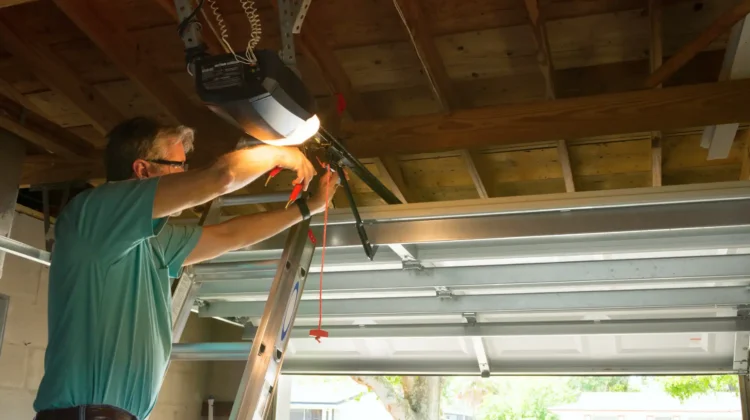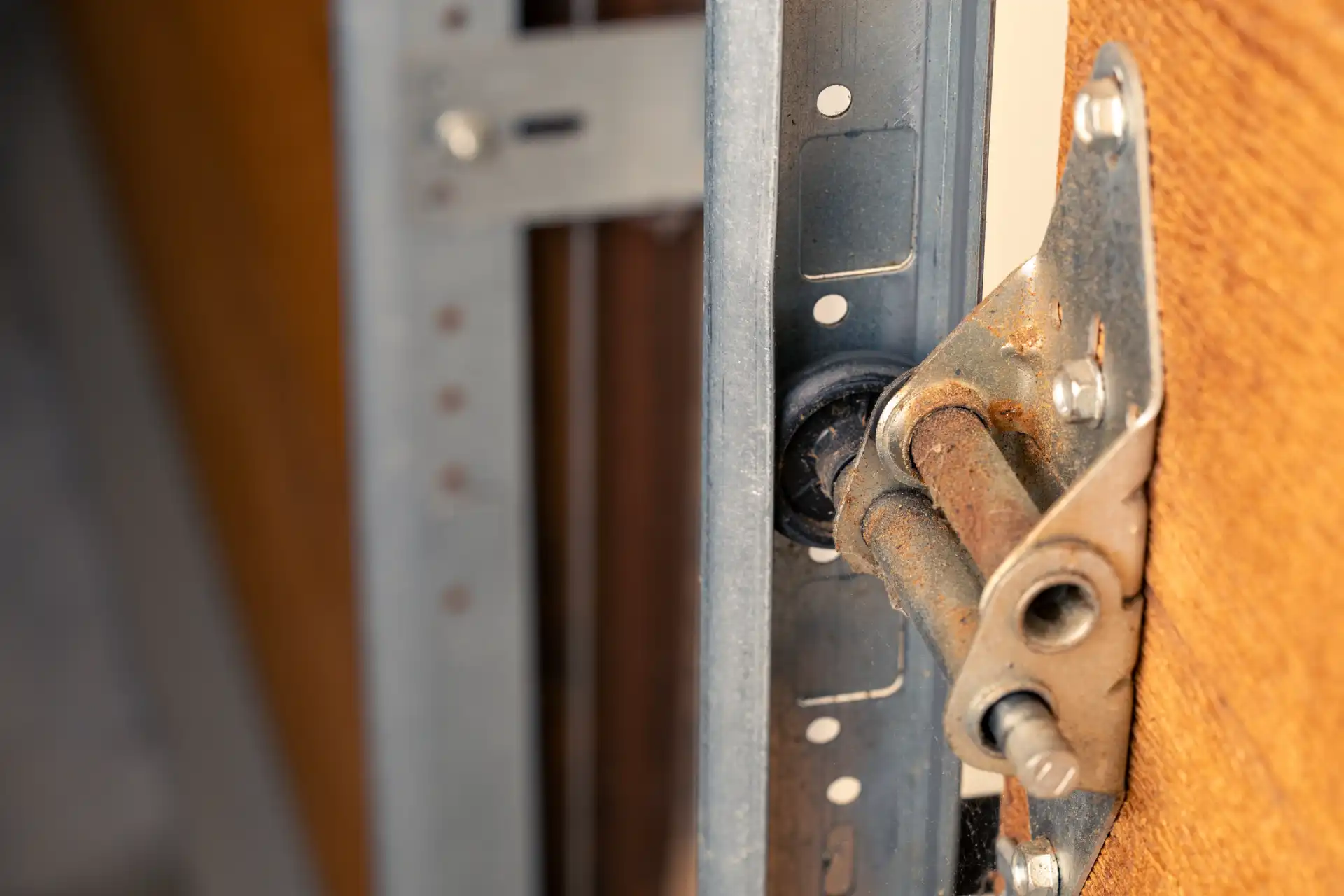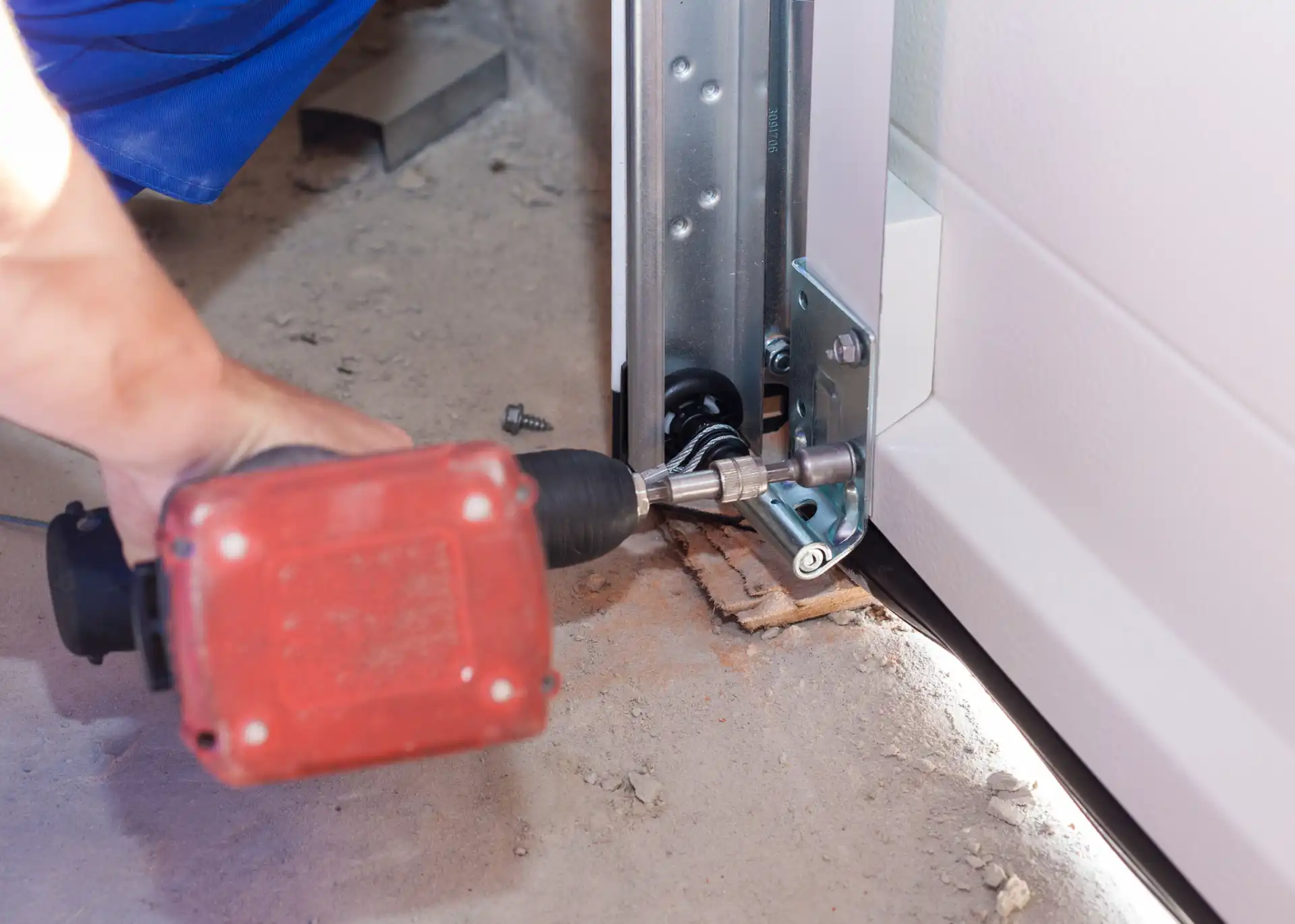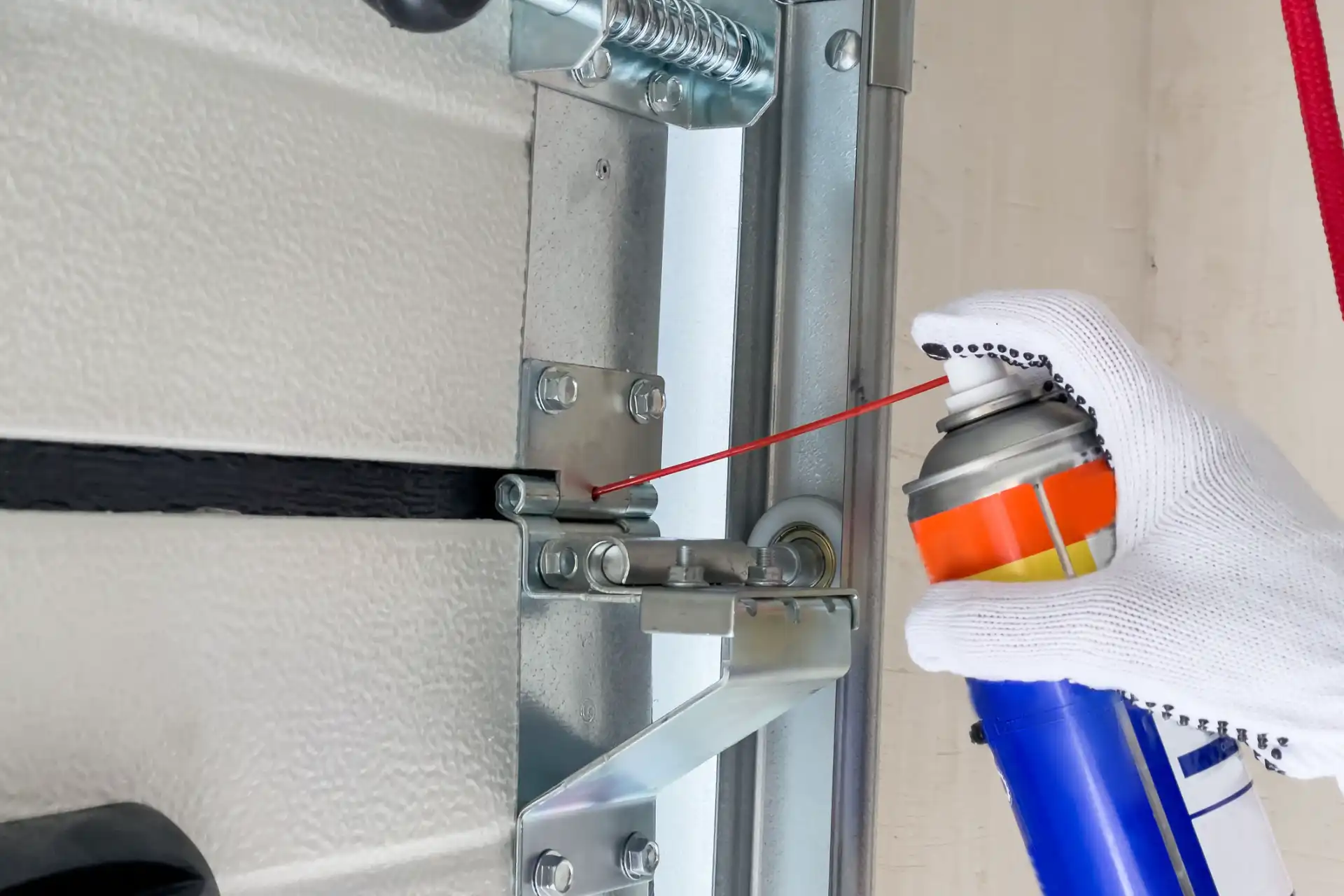
A quiet and smoothly operating garage door is essential for maintaining a peaceful household environment and ensuring the longevity of your door’s mechanism. When your garage door operates without disruptive noises, you can avoid the stress and potential damage that often accompanies loud, unexpected sounds.
Common garage door noises include:
- Squeaking or creaking: Typically caused by dry rollers or tracks, loose hardware, or dirt buildup.
- Grinding: Often due to misaligned tracks, worn opener gears, or metal parts contacting each other.
- Rattling: Usually from loose hardware such as bolts or brackets.
- Banging or clanging: May indicate broken or loose hardware, spring problems, or track issues.
- Clicking: Often related to spring or opener malfunctions.
- Popping sounds: Usually linked to torsion spring issues.
Addressing these noises early can prevent more significant damage and costly repairs. By understanding and troubleshooting common garage door problems, you can ensure your door operates efficiently and quietly. Regular maintenance plays a crucial role in catching potential issues before they escalate into expensive fixes.
Understanding Common Garage Door Noises

Squeaking or Creaking Noises
Squeaking garage doors can be particularly annoying. These noises often arise from:
- Dry rollers or tracks: When the rollers or tracks of your garage door lack lubrication, they can produce squeaky sounds. This is a common issue that can be easily resolved by applying a suitable lubricant.
- Loose hardware: Over time, the nuts and bolts holding your garage door components together can become loose. This looseness causes parts to rub against each other, resulting in creaking sounds.
- Dirt buildup: Accumulation of dirt and debris in the tracks can hinder smooth operation, leading to squeaks and creaks.
Addressing these causes typically involves using lubrication for garage doors. Silicone-based sprays or lithium grease are highly effective for this purpose. These products reduce friction between moving parts, ensuring smoother operation and minimizing noise.
To apply lubrication:
- Clean the tracks: Remove any visible dirt and debris using a damp cloth.
- Lubricate rollers and hinges: Apply the lubricant to the rollers and hinges, ensuring you cover all moving parts.
- Lubricate springs: If accessible, lightly spray the springs to ensure they move smoothly.
Regular maintenance involving lubrication can significantly reduce squeaking noises and extend the life of your garage door components.
Grinding Noises
A grinding noise garage door is a distinct warning sign that something is wrong with the door system. Typical causes include:
- Misaligned Tracks: When tracks are out of alignment, metal components may rub together, creating a harsh grinding sound. This issue often leads to uneven movement or even derailment if left unchecked.
- Worn Opener Gears: Garage door openers rely on internal gears to operate smoothly. Over time, these gears can wear down, especially in older systems or those lacking regular maintenance, resulting in persistent grinding noises.
- Loose Chains or Belts: If your opener uses a chain or belt drive, slack can cause the mechanism to grind as it moves along its path.
- Metal Parts Contacting Each Other: Lack of proper lubrication for garage doors allows metal rollers or hinges to scrape against tracks and brackets.
Ignoring these noises risks escalating minor wear into significant mechanical failures—broken gears, bent tracks, or complete opener breakdowns. Addressing the source promptly keeps your garage door operating safely and quietly, preventing expensive repairs down the line.
Rattling Noises
Rattling noises in your garage door system often signal loose hardware. Components such as bolts, chain drives, or mounting brackets may become loose over time due to regular use and vibrations.
Key causes of rattling garage door noises:
- Loose Bolts: Over time, the constant movement of the garage door can cause bolts to loosen. Regularly inspect these bolts and tighten them as needed.
- Chain Drives: If your garage door uses a chain drive system, ensure that the chain is properly tensioned. A loose chain can rattle against other components.
- Mounting Brackets: Check the mounting brackets for any signs of wear or looseness. Tightening these brackets can help reduce rattling noises.
Importance of addressing loose hardware:
Ignoring these issues can lead to further wear and tear on your garage door system. Regular inspections and maintenance will help you catch these problems early, ensuring a quieter and more smoothly operating door.
Use appropriate tools to tighten any loose components carefully, avoiding overtightening, which can cause additional damage.
Banging or Clanging Noises
Banging or clanging noises often signal serious issues with your garage door system. These sounds can indicate:
- Broken or Loose Hardware: Components such as bolts, nuts, or brackets might have loosened over time or broken completely. This creates instability and causes the door to make loud banging noises during operation.
- Spring Problems: Torsion or extension springs are crucial for the smooth operation of your garage door. If they break or become loose, the door can slam shut, creating a dangerous and loud bang.
- Track Issues: Misaligned or damaged tracks can cause the door panels to hit against each other or the frame, producing a clanging noise.
- Chain Drive Looseness: A loose chain on a chain-driven opener can slap against the rail, resulting in a loud clanging sound.
Addressing these noises promptly is critical for safety and to prevent further damage. Regular inspection and maintenance of hardware, springs, and tracks are essential in keeping your garage door running smoothly and quietly.
Clicking Sounds
Clicking sounds from your garage door usually indicate an issue with the springs or the opener mechanism. This noise can be a sign of:
- Spring Malfunction: Worn or broken springs can cause a clicking sound. Torsion springs, in particular, are under a lot of tension and can be dangerous to handle without proper training.
- Opener Problems: If the opener’s motor is struggling or if there are issues with the gears inside the opener, you might hear clicking noises.
Ignoring these sounds can lead to more significant problems, including complete failure of the door mechanism. In such cases, it’s crucial to call a professional technician who can diagnose and fix the issue safely and effectively. Employing a professional ensures that any underlying problems are addressed correctly, preventing future breakdowns and maintaining smooth operation.
Popping Sounds
A popping sound from your garage door almost always points to a problem with the torsion springs. These springs play a critical role in balancing and lifting the heavy weight of the door. When you hear a sharp pop or bang, especially when opening or closing, this can mean a torsion spring has suddenly snapped or shifted out of place.
Key indicators include:
- A loud, single pop coming from above the door
- The door suddenly feels much heavier or won’t open at all
- Visible gaps in the torsion spring above the doorway
This type of noise is different from other garage door sounds, like squeaking, grinding, or rattling noises. Those issues usually come from dry roller tracks, loose hardware, or a lack of lubrication. But a popping sound indicates a broken torsion spring, which is dangerous.
Trying to fix these springs without the right tools and experience can cause serious injuries. That’s why it’s important to call in professionals for any problems with your torsion springs.
Diagnosing the Source of Garage Door Noises

To find out what’s causing the noises coming from your garage door, you need to do a detailed visual inspection. This means taking a close look at the rollers, springs, tracks, and all the hardware involved in the door’s operation. Most of the time, you’ll be able to figure out what the problem is just by checking these areas carefully.
Step-by-Step Visual Inspection Guide:
1. Rollers:
- Look for wobbling or uneven movement as the door operates.
- Check for flat spots, chips, or excessive wear on the roller surface.
- Listen for grinding or squeaking when rollers move along the tracks.
2. Springs:
- Inspect torsion and extension springs for visible gaps, rust, or deformation.
- Notice any stretching or unusual elongation, which signals fatigue.
- Pay attention to snapping or popping sounds when the door moves.
3. Tracks:
- Ensure tracks are straight and free from dents or bends.
- Remove any debris, dust buildup, or obstructions inside the tracks.
- Check alignment by confirming both sides are parallel and securely fastened.
4. Hardware (Nuts, Bolts & Brackets):
- Look for loose bolts or brackets along the track and at connection points.
- Tighten any visibly loose components with appropriate tools—avoid overtightening to prevent stripping threads.
- Watch for metal shavings or rust around hardware, indicating wear.
Identifying early signs of damage like frayed cables, misaligned components, or excessive rust helps you address minor issues before they escalate into costly repairs. Regularly inspecting these elements keeps your garage door running smoothly and quietly.
DIY Fixes for Common Garage Door Noises

Maintaining your garage door can often prevent annoying noises and ensure smooth operation. Here are some safe maintenance tasks you can perform:
- Lubrication: Use a silicone-based spray or lithium grease on all moving parts, including rollers, hinges, and tracks. This reduces friction and minimizes squeaking or creaking noises. Be careful not to over-lubricate, as it can attract dirt.
- Tightening Loose Components: Regularly inspect nuts, bolts, and brackets. Gently tighten any loose components, but avoid overtightening, which can cause damage.
- Cleaning Tracks and Sensors: Dirt and debris buildup can cause grinding or rattling sounds. Clean the tracks with a damp cloth and ensure sensors are free from obstructions to maintain proper alignment.
- Seasonal Adjustments: Temperature fluctuations can affect the garage door’s components. Check for any signs of warping or misalignment and make minor adjustments as needed to ensure smooth operation throughout the year.
By performing these simple tasks, you can troubleshoot common garage door noises and extend the lifespan of your system.
When to Call a Professional Technician
Certain garage door issues require the expertise of a professional technician due to the inherent safety risks and complexity involved. For instance, broken springs or significant alignment issues fall under this category. Attempting to fix these problems without proper knowledge and tools can lead to severe injury.
Benefits of Professional Maintenance:
- Safety Assurance: Experts are trained to handle high-tension components like torsion springs safely.
- Thorough Evaluation: Technicians provide a comprehensive inspection of your garage door system, identifying hidden issues that could cause future problems.
- Optimal Performance: Ensuring precise alignment and proper functioning of all components guarantees smooth operation and extends the lifespan of your garage door.
- Expertise: Professionals have access to specialized tools and replacement parts, ensuring repairs are done correctly the first time.
For long-term quiet operation of your garage door, relying on professional services is often the wisest choice. Skilled technicians can address complex repairs efficiently, reducing the risk of costly future damage.
Preventative Maintenance Tips to Avoid Noisy Garage Doors
Regular maintenance is the most effective way to keep your garage door operating quietly and efficiently. Ignoring small issues often leads to larger, costlier problems. Implementing a simple routine can help you avoid the headaches addressed in Troubleshooting Common Garage Door Noises: Causes & Fixes.
Key preventative strategies include:
- Lubricate Moving Parts: Use a high-quality silicone-based spray or lithium grease on rollers, hinges, springs, and tracks. Target all metal-on-metal contact points at least twice a year to reduce friction and prevent squeaks and creaks.
- Tighten Components: Inspect and carefully tighten all nuts, bolts, and brackets. Avoid overtightening, which can cause damage or misalignment. Pay particular attention to mounting hardware and opener chains or belts.
- Clean Tracks and Sensors: Dirt buildup contributes to excess noise. Wipe tracks with a damp cloth and use a mild detergent if needed. Clean photo-eye sensors gently to maintain reliable operation.
- Seasonal Tune-Ups: Schedule seasonal inspections for signs of wear, misalignment, or loose components. Cold weather can cause metal parts to contract; check adjustments as temperatures change.
Scheduled inspections — whether done personally or by a professional—ensure early detection of minor issues before they escalate. Consistent attention not only silences annoying noises but also prolongs the lifespan of your entire garage door system.
